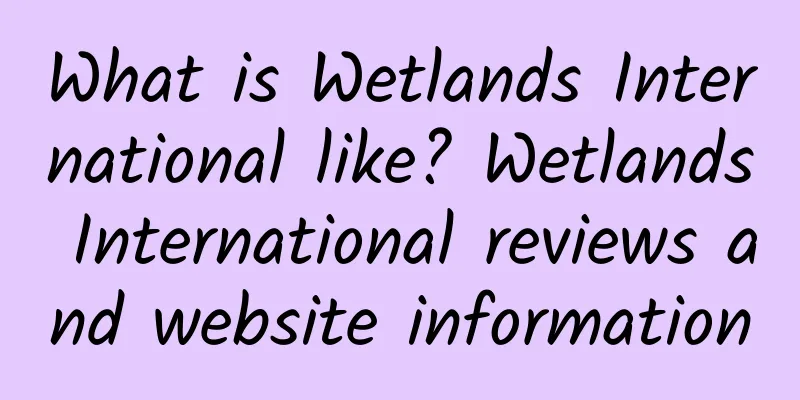What is Wetlands International like? Wetlands International reviews and website information

|
What is Wetlands International? Wetlands International is a global non-profit organization headquartered in Wageningen, the Netherlands. It is dedicated to wetland protection and sustainable management and carries out activities in more than 100 countries and regions around the world. Website: www.wetlands.org Wetlands International: A pioneer in global wetland protectionWetlands, as a unique ecosystem on Earth, play an irreplaceable role in maintaining biodiversity, regulating climate, and providing resources for humans. However, with the acceleration of urbanization and the impact of human activities, wetlands are facing unprecedented threats. Against this background, a global organization dedicated to wetland protection and sustainable management, Wetlands International, came into being. Wetlands International was founded in the 1930s and is headquartered in Wageningen, the Netherlands. It is a global non-profit organization. With the protection and restoration of wetland ecosystems as its core mission, it carries out activities in more than 100 countries and regions around the world. Through scientific research, policy advocacy, community participation and project implementation, Wetlands International has become an important promoter in the field of global wetland conservation. This article will provide a detailed introduction to Wetlands International’s historical background, core mission, main work content and its global influence, to help readers fully understand this pioneering force dedicated to wetland protection. History and Development of Wetlands InternationalThe origin of Wetlands International can be traced back to the early 20th century, when people's understanding of wetland ecosystems was relatively limited, but some pioneers had already realized the importance of wetlands and began to pay attention to the threats they faced. In 1931, in response to the sharp decline in the number of migratory waterbird populations, some European scientists and environmentalists established the International Wildfowl Inquiry, which was the predecessor of Wetlands International. Over time, the organization gradually expanded its scope of concern from single waterbird protection to the protection of the entire wetland ecosystem. In 1956, the organization was renamed the International Wetlands Research Bureau, and in 1967 it became one of the technical support agencies of the Ramsar Convention. The Ramsar Convention is the world's first international treaty on wetland protection, which aims to promote the protection and rational use of wetlands through international cooperation. After entering the 21st century, Wetlands International further clarified its mission and goals and officially changed its name to "Wetlands International" in 2004. Today, Wetlands International has become a global network organization with multiple regional offices and partners, dedicated to promoting the development of wetland protection. Wetlands International's core missionWetlands International’s core mission can be summarised in three main areas: protecting wetland ecosystems, promoting sustainable management and raising public awareness. 1. Protect wetland ecosystemsWetland ecosystems are one of the most biodiverse ecosystems on Earth and are also key habitats for many species. However, due to factors such as land development, pollution, and climate change, wetlands are disappearing or degrading at an unprecedented rate. Through scientific research, monitoring and assessment, Wetlands International identifies wetlands that need to be protected as a priority worldwide and develops corresponding protection strategies. For example, Wetlands International is actively involved in the implementation of the Ramsar Convention, assisting governments in designating and managing Ramsar Sites, which not only have important ecological values but also provide important economic and social benefits to local communities. 2. Promote sustainable management of wetlandsWetlands International recognizes that simply protecting wetlands is not enough, and that a balanced approach needs to be found so that wetlands can provide services to humans without compromising their ecological functions. To this end, Wetlands International advocates "Nature-based Solutions" and encourages the integration of wetland ecological functions into social and economic development. For example, in the fields of agriculture, fisheries and water resource management, Wetlands International works with local governments, businesses and communities to promote sustainable land use and reduce negative impacts on wetlands. At the same time, they also help local residents make better use of wetland resources through technical training and support, achieving a win-win situation for ecological protection and economic development. 3. Raise public awarenessThe success of wetland conservation depends on the support and participation of the public. Therefore, Wetlands International attaches great importance to education and publicity, and through organizing events, publishing reports and producing multimedia content, it popularizes wetland knowledge to the public and raises people’s awareness of the importance of wetlands. February 2nd of each year is World Wetlands Day, which was established to commemorate the signing of the Ramsar Convention. As one of the main promoters of this festival, Wetlands International organizes various activities such as lectures, exhibitions and field trips to attract public attention to wetland protection issues. Wetlands International's main workWetlands International’s work covers scientific research, policy advocacy, project implementation and capacity building. The following is a detailed introduction to its main work content: 1. Scientific research and data collectionScientific research is the foundation of Wetlands International’s work. Through long-term monitoring and assessment of wetland ecosystems, Wetlands International has accumulated a large amount of data on wetland conditions and changing trends. These data are not only used to guide its own conservation actions, but also provide important decision-making basis for governments and international organizations. For example, the Global Wetland Outlook report published annually by Wetlands International provides a detailed analysis of the current status of wetlands around the world, the threats they face, and possible future changes. This report has become an important reference in the field of international wetland protection. 2. Policy advocacy and international cooperationWetlands International is actively involved in the formulation and implementation of international environmental policies, especially under the Ramsar Convention. As one of the technical support agencies of the Convention, Wetlands International provides technical support and advice to the Parties to help them fulfill their obligations under the Convention. In addition, Wetlands International also works closely with other international organizations and institutions to jointly promote the wetland conservation agenda. For example, cooperation with the United Nations Environment Programme (UNEP), the World Conservation Union (IUCN) and other organizations has made wetland conservation occupy a more important position in the global environmental protection agenda. 3. Project implementation and community participationWetlands International has carried out a large number of conservation projects around the world, covering wetland restoration, habitat protection, water resource management and other fields. The successful implementation of these projects is inseparable from the active participation and support of local communities. Taking the Lake Chad Basin in Africa as an example, Wetlands International has worked with local communities to effectively mitigate the impact of lake shrinkage on the lives of local residents by restoring wetland vegetation and improving water resource management. Similar projects are also being carried out in the Mekong Delta in Asia and the Pantanal Wetlands in South America. 4. Capacity building and technical trainingIn order to ensure the sustainability of wetland conservation work, Wetlands International attaches great importance to capacity building and technical training. They regularly provide training for government officials, researchers and community leaders to help them acquire relevant knowledge and skills in wetland conservation. In addition, Wetlands International has developed a series of tools and guidelines, such as the Wetland Ecosystem Services Protocol (WEP), to provide practical technical support to countries in wetland conservation and management. Wetlands International’s global influenceAfter decades of efforts, Wetlands International has established a wide range of influence around the world. The following are some specific achievements and impacts: 1. Promote the international wetland conservation agendaAs one of the main technical support organizations of the Ramsar Convention, Wetlands International has played an important role in promoting the global wetland conservation agenda. By participating in the negotiation and implementation of the convention, Wetlands International has helped governments to formulate more scientific and effective wetland conservation policies. 2. Restore and protect key wetlandsWetlands International has successfully implemented many wetland restoration and protection projects around the world, saving many endangered wetland ecosystems. For example, in the mangrove restoration project in Southeast Asia, Wetlands International has significantly improved the flood control capacity and biodiversity of coastal areas by planting mangrove seedlings and controlling illegal logging. 3. Raise public awarenessThrough continuous education and publicity activities, Wetlands International has successfully raised public awareness of the importance of wetlands. More and more people are beginning to pay attention to wetland conservation issues and actively participate in related activities. This public support has injected strong momentum into wetland conservation. 4. Build a partner networkWetlands International has established extensive partnerships with governments, non-governmental organizations, academic institutions and the private sector, forming a strong network of partners. This cooperation not only strengthens the power of wetland protection, but also provides opportunities for all parties to exchange experiences and share resources. ConclusionAs a global non-profit organization, Wetlands International has been committed to wetland conservation and sustainable management since its establishment. Through scientific research, policy advocacy, project implementation and capacity building, Wetlands International has made remarkable achievements around the world and made important contributions to the protection of this important ecosystem on the earth. However, wetland protection is still a long and arduous task. In the face of challenges brought by climate change, population growth and economic development, we need more organizations like Wetlands International to join us in working together to protect wetland ecosystems. Let us work together to leave a healthy and beautiful wetland for future generations. Wetlands International official website: www.wetlands.org |
<<: What is Centene like? Centene company reviews and website information
Recommend
Green cauliflower pictures, nutritional value and efficacy of green cauliflower
Broccoli is a type of broccoli. Common broccoli c...
How to cook donkey ear grass? How to eat donkey ear grass at home
Donkey's ear grass is also called dog's t...
What is Cesena Football Club like? Cesena Football Club reviews and website information
What is the website of Cesena Football Club? Cesen...
The benefits of folic acid supplementation for pregnant women
Everyone must be familiar with the name of folic ...
What can be cooked with sago? What can't be eaten with sago?
Sago is a healthy food that can regulate the sple...
The efficacy and function of wild Qiqi
In the wild, forests and fields of nature, you ca...
What is collagen? What are the effects and functions of collagen?
Many people have heard of collagen and know that ...
Goji Berry and Cucumber Porridge
The taste of wolfberry and cucumber porridge is q...
How is ZARD? ZARD review and website information
What is ZARD? ZARD (alias: ザード) is a famous Japane...
The medicinal value of Pyrus duli and its efficacy and function
Do you know Pyrus duli? It is a plant of the Rosa...
The efficacy, effects and contraindications of corn porridge
Corn is a kind of food similar to millet. It is b...
The pros and cons of drinking red wine regularly
China is a major producer of liquor, and most peo...
How to choose good eggplant and how to cook it deliciously
There are two types of eggplants in the vegetable...
How to squeeze kiwi juice to make it taste good? What to squeeze kiwi juice to make it taste good?
When kiwi fruit is on the market in large quantit...
Pumpkin powder production steps
Have you ever eaten pumpkin powder? My mother oft...









